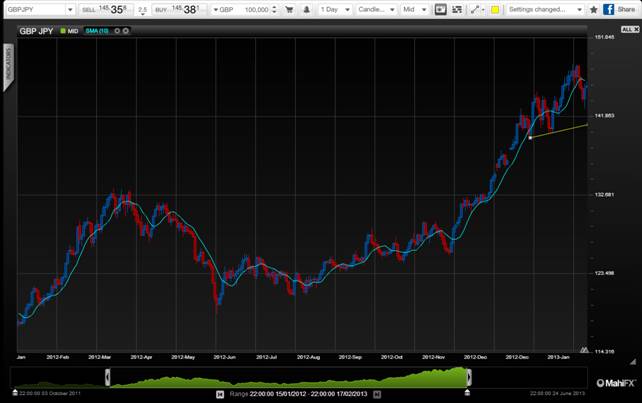Agreement at the G20 over halting competitive devaluations has done little to allay fears of an escalating currency war and may have barely provided a brief pause in this saga with more skirmishes almost a certainty.
The main take-away from the G20 for the currency warriors is to make their objectives less obvious. For the victims, mostly countries with more favourable economic prospects, they will have to make more noise and possibly voice real threats if there is any chance of bringing competitive devaluations to a halt.
It’s remarkable that so soon after the G20 agreement that Martin Weale, a policy maker at the Bank of England, was talking about how a weaker GBP would benefit exports. Markets read that as the Bank of England talking the GBP down and it duly responded by hitting a seven month low against USD at one point.
GBP/JPY chart – A race to the bottom
Japan, which so blatantly talked its currency down over recent months was not publicly reprimanded at the G20. They’ve got away with it so far, quite possibly with the acquiescence of their ally the U.S. Nonetheless, Japanese officials have been talking about achieving a rate of USD/JPY 100 and they’re nearly there so it’s possible JPY will stabilise for a while, maybe until the appointment of the new Bank of Japan governor next month or even until it starts its open ended asset purchasing programme next year.
The perfect setting for currency wars
The problem for Japan and increasingly for western countries is ageing populations. Japan is ahead of the West in this regard with nearly a quarter of its 128 million population over the age of 65 and by 2060 that is forecast to rise to 40% with the population shrinking to 87 million people. It’s hardly a surprise that Japan leads the world in automation and robotics as it tries to fill the gaps left by a shrinking workforce.
Also, older people and especially retirees tend to spend less as they’re passed their years of peak consumption. Combine that with the fact that household consumption makes up 60% of the Japanese economy and it is clear that exports are the only real short- to medium-term driver left for boosting its economy. The problem with an exporting strategy is that nearly all developed countries face demographic decline including China and Russia. It is a situation unprecedented in human history.
It’s difficult to see how yet another spending spree on infrastructure projects and more money creation is going to compensate for, let alone reverse, the structural decline in household consumption in Japan and other countries. Indeed, if Japan were to succeed in stimulating inflation it may actually slow its economy even more if consumers see their spending power eroded.
The concern with a global currency war is that it is likely to end badly. The one in the 1930s led to trade protectionism and made the great depression worse and the second one during the 1960-1980s helped fuel bursts of high inflation in the 1970s.
The aftermath of a severe banking crisis and the growth sapping nature of demographic decline actually sets the perfect backdrop for currency wars and until those influences are more clearly acknowledged by policy makers the temptation for currency devaluations will persist.

